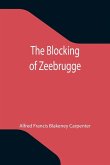"The Blocking of Zeebrugge" recounts one of the most daring naval operations of World War I: the Zeebrugge Raid. Penned by Alfred F. B. Carpenter, this historical account delves into the meticulous planning and execution of the British attempt to block the vital German U-boat base at Zeebrugge, Belgium. A pivotal moment in British military and naval history, the Zeebrugge-Ostend Raids of 1918 aimed to disrupt German submarine activity, offering a strategic advantage in the ongoing conflict. This book provides a detailed narrative of the raid, capturing the intensity and bravery of those involved. A classic work of military history, "The Blocking of Zeebrugge" remains a compelling read for anyone interested in World War I, naval warfare, and the strategies employed during this critical period of the 20th century. This work has been selected by scholars as being culturally important, and is part of the knowledge base of civilization as we know it. This work is in the public domain in the United States of America, and possibly other nations. Within the United States, you may freely copy and distribute this work, as no entity (individual or corporate) has a copyright on the body of the work. Scholars believe, and we concur, that this work is important enough to be preserved, reproduced, and made generally available to the public. We appreciate your support of the preservation process, and thank you for being an important part of keeping this knowledge alive and relevant.
Bitte wählen Sie Ihr Anliegen aus.
Rechnungen
Retourenschein anfordern
Bestellstatus
Storno









